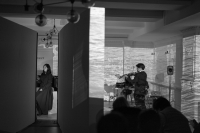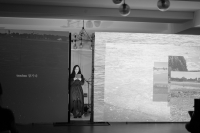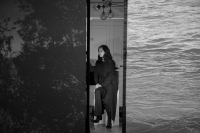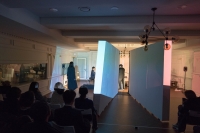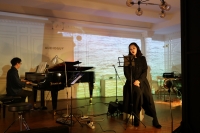_
_
Dichterliebe : Detachment
(Schumann)
text, drawing, film_Bom, roya
2019.12.6-7
@Audio Guy
Supported by Seoul Foundation for Arts and Culture
슈만의 <시인의 사랑> 연가에서 하이네의 시는 분명 언어적 가치가 있는 역설과 암시일 것이다. 그러나 나는 번역본으로 된 그의 시를 읽으며 점점 문장과 대척적으로 부딪혔다. 심지어 사랑하는 대상을 표현한 대부분의 심상으로부터 멀어졌다. 결국 시적 언어로조차 표현될 수 없을 때 슈만의 음악적 서술이 시작된다는 해석의 관점을 조금더 적극적으로 활용하여, 문장 대부분을 걷어내고, 원어의 사전적 의미를 찾아보며 마음에 와닿는 단어를 골랐다. 이는 여성 성악가의 목소리와 전자 음악의 사운드와 함께 남성 화자가 아닌 여성 화자의 서사로 흐르게 만드는 장치이다. 작업의 소재를 찾고자 올해 초 라인강에 직접 갔었다. 물결의 모양을 관찰하고 강의 주변을 걸었다. 어느 순간 갑자기 결빙된 강을 보았던 오래된 기억이 떠올랐다. 그때 잠시 슈만의 죽음과 시에 담긴 사랑과 고통을 생각했다. 공연에 쓰인 텍스트와 이미지는 그 찰나를 포함하되, 흐르는 강을 바라보고 있는 상태이다. 그 뿐이다. 나머지는 얼어붙지 않은-내가 공감할 수 있었던-문장을 나열하여 나와 당신의 사랑을 말 할 수 있게끔 남겨놓았다.
In Schumann’s Dichterliebe, Heinrich Heine’s poems are obviously paradoxes and implications with linguistic value. However, as I read his poems translated into Korean, I felt against the sentences. I even got distanced from almost all the images depicting the beloved one. I ended up taking a perspective interpreting that Schumann’s musical narrative begins when it cannot be expressed in poetic language, and I chose words that come to me, erasing almost all the sentences and looking at the exact meanings of the original words. Along with the voice of a female classic singer and the sounds of electronic music, this is a device to make the work centering on a female narrator, not a male one. To find out the subject matters, I visited the Rhine River. I observed the waves and walked along the river. Suddenly, a memory of looking at a frozen river came to me. At that moment, I thought about the death of Schumann and the love and pain in the poems. I included this moment, and also, the status of looking at the flowing river in the texts and images of the performance. But that is it. The rest of the work is for the love between you and me, through the sentences that were not frozen and touched me.
